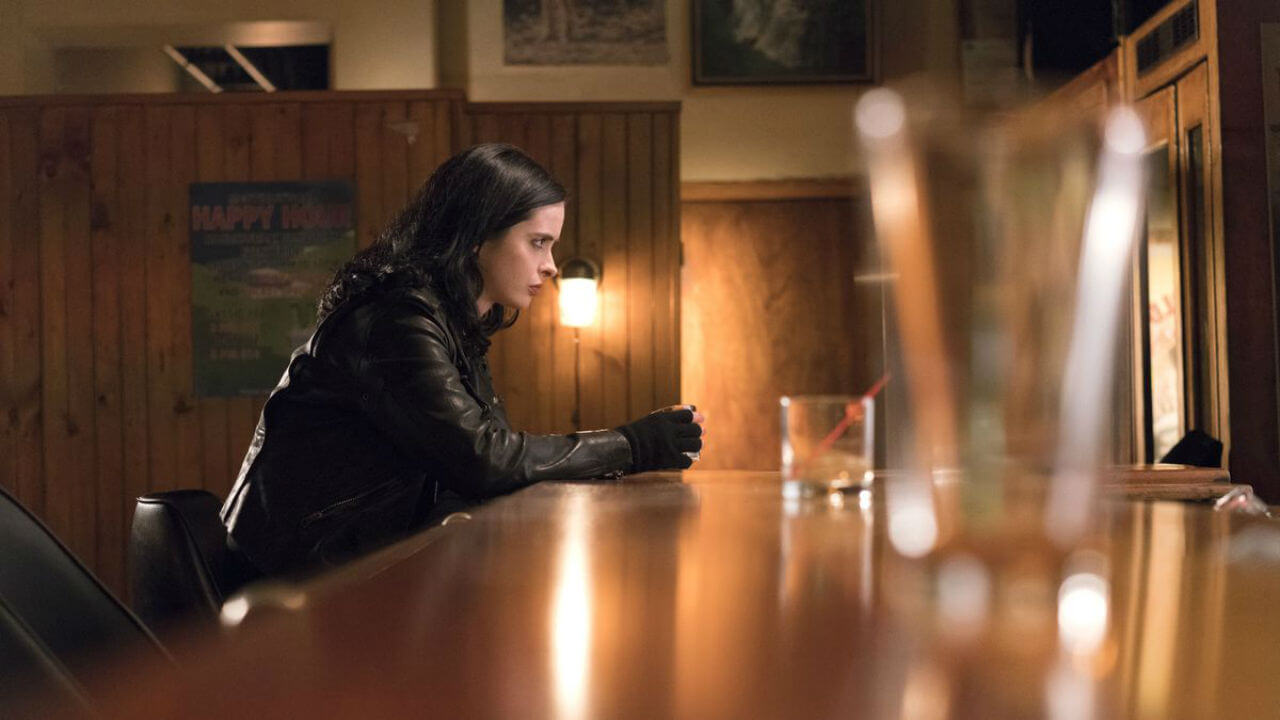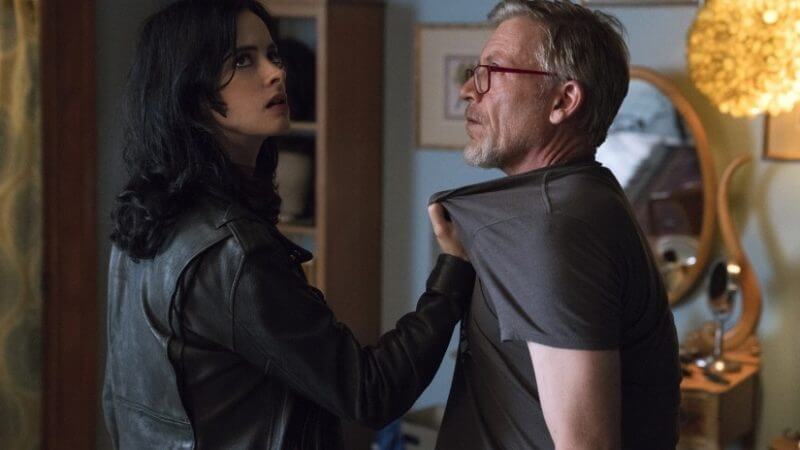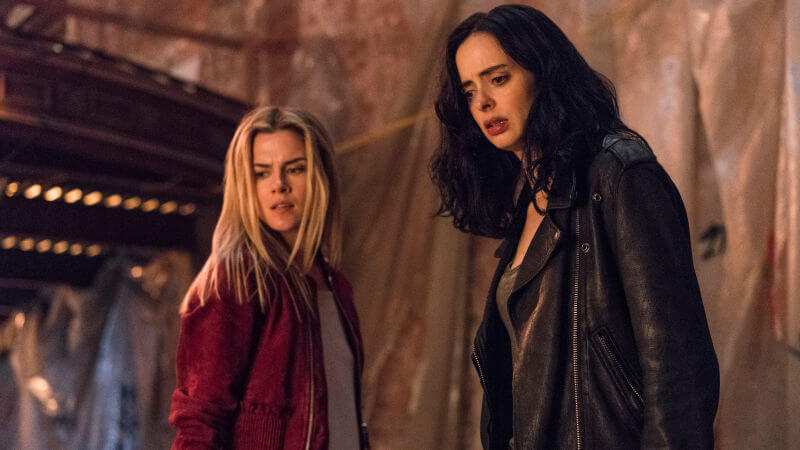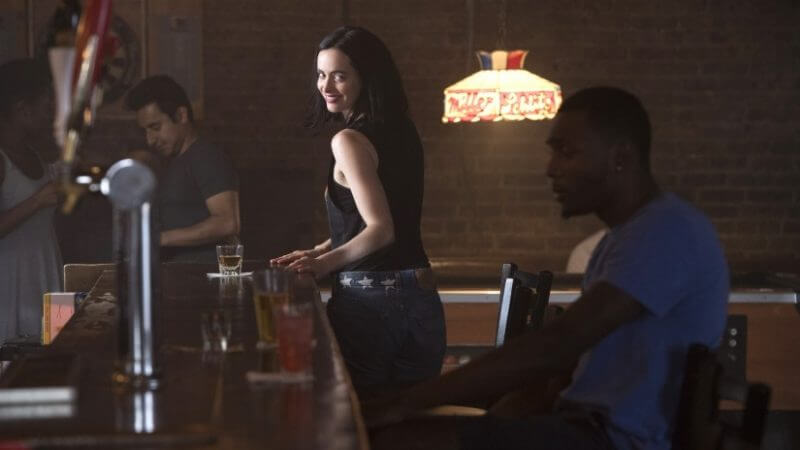Title: Jessica Jones Season 2 Review
Air Date: March 8, 2018
Network: Netflix
Genre: Action, Detective, Drama, Psychological Thriller, Superhero
Like many Marvel fans, the first season of Jessica Jones stood out as one of the best shows on television. Integrating investigative and psychological elements into a superhero show helped it stand out from the rest of the combat-focused Defenders shows. The sophomore season runs into a bit of a slump, however, due to melodrama and questionable antagonists.
While there is a little reference the events of The Defenders, which is far more recent than Jessica Jones season one, the show starts off strong, showing Jones struggling with everything that has happened to her. It’s obvious from the get-go that the post-traumatic stress will be a focal point that fuels her motives this season. Just like in season one, Krysten Ritter does a phenomenal job as Jones. She manages to display the characters typical sarcasm flawlessly but also delves into a lot of the emotion she keeps pent up inside her as well.
In typical Jessica Jones fashion though, she chooses to solve her problems at the bottom of a bottle, wanting to forget and simply move on. It doesn’t take long before Jones’ past starts to catch up though. Following the threads of last season, Trish pushes Jessica to pursue her past with IGH, the company behind her powers.
IGH was an interesting way to tether characters together last season, but I would have much rather this season sprinkle it in as an overarching storyline, rather than the main focus. Instead, it tries to balance the IGH storyline with the trama Jessica is feeling. While it makes sense to interlace the stories, the latter was far more interesting in my opinion.
Balancing the public’s opinion on her following the death of Kilgrave led to a very interesting idea. While many see her as a hero for doing so, there are plenty that believe she is a murder too, even if justified. This results in the classic comic question of killing being justified and Jessica’s struggle with it. Even though it is a tired cliche, I think the show handled her moral dilemma with it far better than most, even Daredevil. Reactions to her did seem to feel exaggerated at times though, especially when it came to Trish “Patsy” Walker.
Walker and Jones’ relationship in the first season felt natural. While they both showed flaws, there was always reasoning to their conflict. This season felt completely different. While the goal was definitely to make Trish seem unreasonable and selfish, due to her history of addiction, many of the situations seemed to arise simply because of something stupid Patsy would do. In fact, the entire main story doesn’t happen if Trish doesn’t pressure Jessica into doing it. As a result, the flow of the season was odd.
IGH and its intentions eventually turn out to be a lot different than originally implied. I appreciated the fact that they turned the idea of an evil corporation on its head. The end result created morally gray antagonists. The problem is that they chose to lean on the most tiring cliche in all of entertainment regarding one of the morally gray antagonists: a dead family member actually being alive. Couple this with the fact that it ends that the hero and the main antagonist have the exact same powers made me lose interest in what could have been a promising storyline.
Throughout all of this, there are plenty of side stories occurring involving Trish, Hogarth, and Malcolm. While they all overlap, the most compelling parts didn’t require any relationship to any of the other storylines because they were so strong. Malcolm’s character arc was refreshing, showing off his wit and charisma. I enjoyed how they handled his struggle with addiction in tandem with Trish’s, though both were both done reasonably. His character was one of the few that ended with a hopeful outlook.
A lot of Jessica Jones’ strength as a show revolves around how she handles the messed up things that occur in her life. But this season simply felt too bleak. Having her best friend acting like an ass, a family member returning from the dead, and all of the stuff in between was too much. The attempt to remedy that bleakness falls flat too. While Jessica ends the season happily with Oscar Arocho’s family, their relationship felt forced. The guy who catcalls her in the bar seemed to have better chemistry.
A lot of what wrapped up the season felt either forced or undeserved. Especially Trish’s storyline. Seeing Walker act like a brat all season served its purpose to make her into an antagonist for coming seasons for sure though, as did a lot of the stories and themes of the season.
All in all the second season simply feels like a building season, setting up potential future storylines and conflict, while neglecting to drum up anything interesting in the current season. When it does stick to its roots, Jessica Jones season two is strong, but there is simply too much melodrama and tropes to support the rest of it.
https://www.youtube.com/watch?v=hSvnepZS26s
Verdict: Jessica Jones season two diverts from what made the first season so special: investigation and psychology. Instead, it deals with melodrama and family issues that have already been done before. There are specks of the brilliance of season one laced throughout, but they never seemed to be the main focus. Here is hoping that all the building they did this season will help the show return to its roots next time around.
[review]










